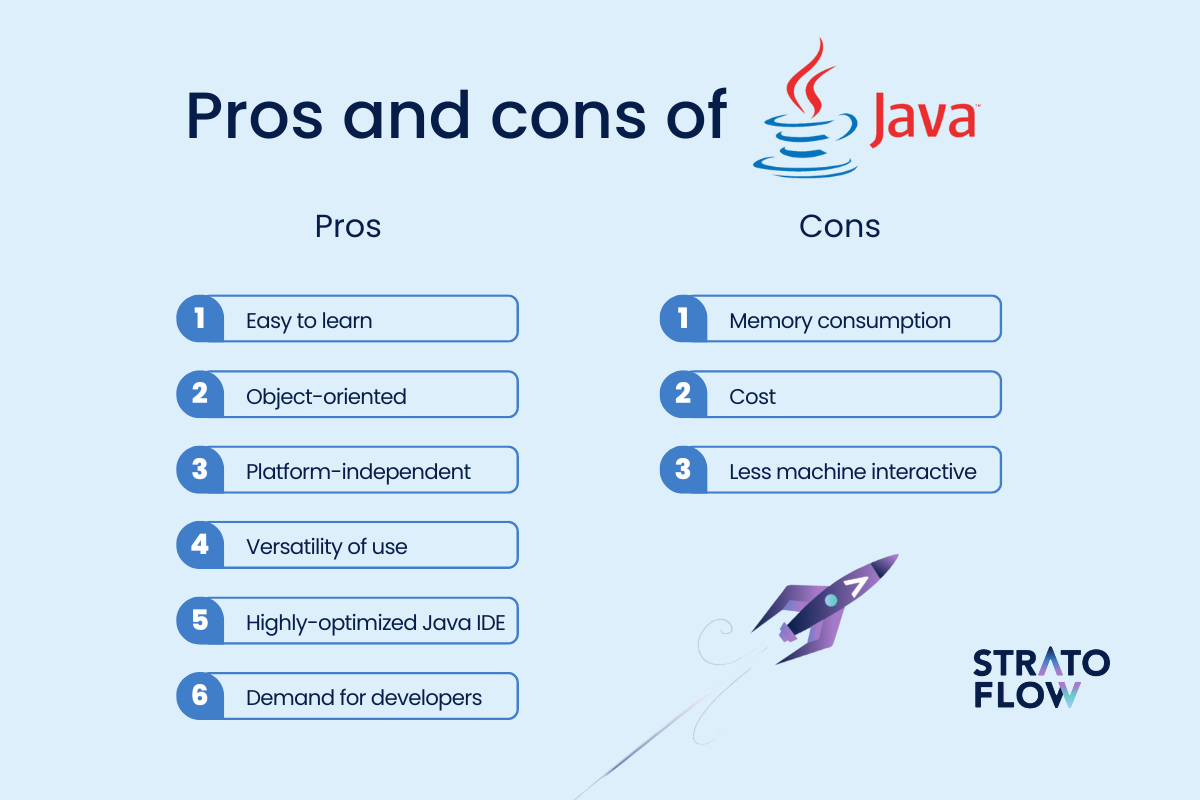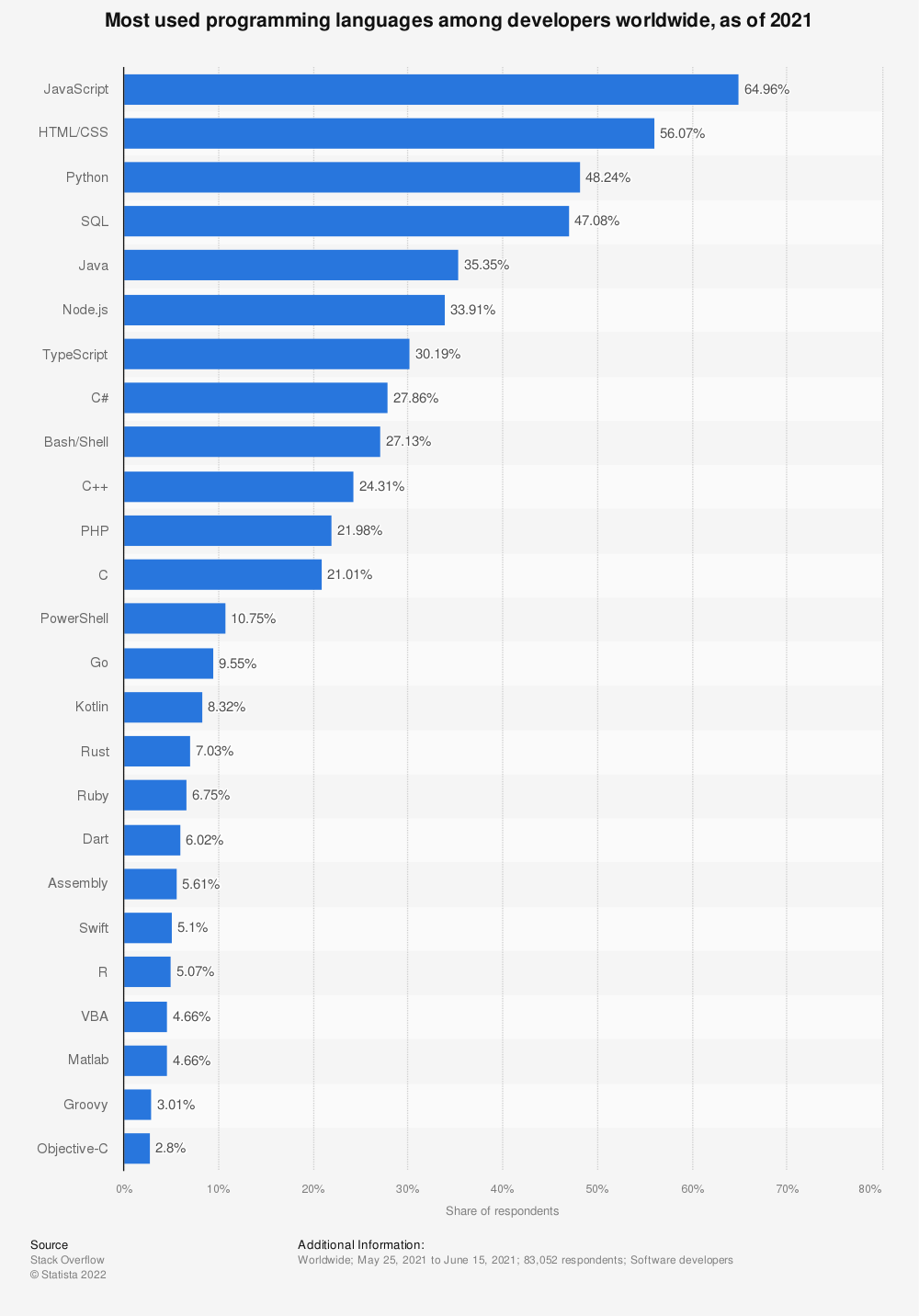
How is Java Used in Software Development in 2024: The Ultimate Guide
2024 marks 29 years since Sun Microsystems released the Java programming language to the public. It was meant to provide easy interactivity and multimedia access, which was well suited for the rapid World Wide Web development at the time.
Long story short, Java proved to be highly successful, and it has since remained one of the most popular programming languages in the world ever since.
In today’s post, we will dive deeper into specific business situations in which Java proved to be an indispensable asset for software developers. We will also take a look at how Stratoflow developers use Java to fulfill project objectives tasked by our clients.
Contents
- Basics of Java
- How do software engineers use Java?
- What is Java used for?
- Why is Java so popular?
- How is Java used in software development?
- Companies that use Java
- The most notable Java use cases
- How to build high-performance software in Java
- How do we use Java at Stratoflow?
- Benefits of Java
- Drawbacks of Java
- Other programming languages used in software development
Basics of Java
Java’s history began in the early 1990s when Sun Microsystems was developing a version of C++ that was more portable, equipped with automated memory management, and more suitable for modern multimedia. Today, the logo of an orange, steaming coffee cup is a widely recognizable symbol in the field of custom software development across the world.
Java in its core is an open-source and free-to-use programming language. It is object-oriented programming (OOP) which is one of the reasons for Java’s remarkable popularity throughout the years. Because it is an OOP programming language, it offers developers a clever modular structure that greatly simplifies advanced problem-solving tasks.

How do software engineers use Java?
Java programming language is mostly oriented toward back-end functionalities, it can be used to build applications for a wide scope of platforms.
Thanks to a wide range of frameworks and libraries, Java can be used to develop software for desktops computers, enterprise servers, mobile devices as well as web browsers.
Object-oriented languages, like Java, make complex problems easier to solve and provide greater modularity. Java objects allow for the code to be reused, which simplifies testing as well as troubleshooting.
[Read also: Java Clean Code: How to Write It? Best Practices From Experts]
What is Java used for?
Java, unlike some other programming languages, is used in a multitude of different scenarios from ordinary GUI applications, to advanced back-end systems and game development. Here, we have listed some of the most notable use cases of the Java programming language:
Desktop GUI Applications
One of the main ways that developers use Java is to create a graphical user interface for desktop applications. There are numerous Java Frameworks available, significantly improving the speed of developing GUI Applications such as Swing, AWT, or JavaFX.
Web-based Applications
The main thing that set Java apart from other programming languages back in the day were its applets that could run in a web browser. Even though now, applets are a thing of the past, creating web apps is still one of Java’s strong suites as technologies like Struts, JSP, or Servlets enable the creation of advanced web applications. After all, Java is known for being a proven server-side programming language.
Game Development
Even though most of the modern game engines such as Unity and Unreal Engine run on C++, there are still a couple of notable examples of games based on the Java environment – most importantly Minecraft Java edition. There are numerous frameworks, tools, and libraries available, such as LibGDX and OpenGL API that allow developers to create titles for game consoles and mobile devices.
Big Data Technology
A very popular and widely used open framework associated with Big data called Hadoop is entirely written in Java. Considering its features like memory distribution, advanced automatic garbage collection, and stack provision system, Java is a very tempting choice when building robust BigData enterprise applications.
[Read also: Why use Java for Data Science?]
IoT devices
IoT, or the internet of things, is consistently gaining popularity with the introduction of devices like Amazon Alexa. Software engineers often regard Java as one of the best languages for IoT device development. It results from the fact that Java code has the ability to run on a wide variety of devices, reducing the overall workload.
Cloud-Based Applications
Cloud-native has been one of the biggest trends in software development for quite a while, and Java programming language has been a vital part of its progress throughout the years. Because of its low cost and popularity, many companies use Java to develop SaaS and PaaS services in the cloud. What’s more, its unique functionalities like containers, JVM optimizations, multi-purpose frameworks, and native image technology offer further advantages when it comes to cloud-based development.
Mobile applications
You might not have known that Java has also had a significant influence on the mobile market as well. Even with the emergence of Kotlin as the new preferred language for Android app development in 2019, Java is still widely used today. The Android development community fancies this programming language, mainly thanks to its wide range of tools and libraries. It is also worth noting that some of the most popular android apps like Spotify and Twitter are developed mainly in Java.
Why is Java so popular?
There are myriad reasons why Java for the past two and a half decades has remained one of the most popular programming languages in the IT market.
Java stands out from the competition not only thanks to its impressive functionality and robust security measures, but also to user-friendliness, and the active community of experienced developers. It’s a perfect choice for an application development.
Below, we’ve pointed out 5 key factors that are responsible for Java’s persisting popularity in the past years.
Scalability
As your business grows, your IT infrastructure grows with it – that’s the core idea behind the concept of scalability. You can extend your system by physically adding more CPU units and memory resources although, in order not to hinder the performance and to use the available resources most effectively, the software must be prepared to scale out along with the hardware.
Java luckily has a multitude of tools that enable building enterprise-grade software with scalability in mind. It supports modularity, static checking, advanced tools for analysis, and debugging, as well as libraries that provide asymptotically optimal algorithms and data structures.
[Read also: Guide to Java Profilers: Which Performance Monitoring Tool Is the Best?]
Memory-Management
Java provides its automatic mechanism for managing the memory, known as garbage collection. It compiles to bytecode that can be run on a Java Virtual Machine. It also automatically deletes the objects that are no longer used by the application. These functionalities greatly improve the speed of the application.
Cross-Platform
Java programming language is cross-platform, which means, a compiled program can be run on different devices. After compiling a Java program, the Java code gets converted into the platform-independent bytecode. This bytecode can be then run by any machine with JVM installed.
Multi-threading
Modern, enterprise-grade CPU units like the Epyc line of AMD processors can have up to 128 threads, which was an unimaginable number just 10 years ago.
Multi-threading in Java allows concurrent execution of commands on two or more threads simultaneously. It enables better utilization of the CPU, especially in more advanced, high-performance machines.
Thriving community
Java is an open-source programming language that enjoys a great level of community support. Numerous online forums provide aspiring developers with helpful software tools and tips on improving their code.

How is Java used in software development?
Java is more commonly used in our daily lives than you might initially think. In total, it is estimated that up to 97% of Enterprise Desktops run Java. What’s more, in the US, 89% of personal desktops have Java Runtime Environment (JRE) installed.
Companies that use Java
There are numerous organizations such as Google, Airbnb, Instagram, Pinterest, Uber, Netflix, and Spotify that use Java in their primary tech stack.
These companies have chosen Java as their programming language of choice mostly because of its powerful features delivering high-performance software.
Apart from it, Java also makes enterprise applications more secure, and easily scalable, which is a must for online-based businesses.
The most notable Java use cases?
The use cases of Java do not end on the enterprise software for large companies. Not only has software written in Java entertained billions of people worldwide, but it also broadened our horizons on the frontier of scientific endeavors.
Here are some of the most interesting examples:
Mars Rover controller
In 2004 NASA scientists at the Jet Propulsion Laboratory (JPL) used the Java-based Maestro Science Activity Planner to control the Spirit Mars Exploration Rover as it explored the red planet.
[Read also: What’s the Future of Digital Transformation and Its Trends? An Expert’s Point of View]

Wikipedia Search
It makes sense that the largest, online open-source encyclopedia should be based on open-source software—and feature a search engine written in Java. From 1999 Wikipedia used the Lucene engine which was replaced in 2013 with Elasticsearch – a distributed, REST-enabled search engine also written entirely in Java.
Minecraft
A game world 1,5 times the size of earth, letting you build virtually anything that you can imagine, perfect for adults and children alike. Developed entirely in Java by Markus “Notch” Persson and released in the alpha phase in 2009, Minecraft even after 13 years is still a never-ending source of creativity and holds the title of one of the most influential games of all time.
Integrated Genome Browser
In the ‘90s scientific supercomputers worldwide were trying to sequence the complete human genome – a gargantuan task completed after 13 years of hard work. When the work was done, scientists were facing another problem though – how to use all of this data effectively? Enter the Java-based genome browser – an advanced visualization tool developed to explore both the foundational datasets and the reference gene annotations.
Popular online services
You would be surprised to learn how many popular applications are Java-based. Take for example Google’s Android Car and Android TV apps which are almost entirely written in Java. What’s more, the majority of Netflix’s applications also use this language.
[Read also: The Future of Software Engineering: Key Emerging Trends in 2024]

How to build high-performance software in Java
At Stratoflow we believe that in today’s rapidly changing market landscape the most valuable characteristics of an IT infrastructure are scalability and high data throughput. We also follow three core principles when working with our clients:
- Understanding the specifications of the clients’ operations and the types of data that they are dealing with,
- Choosing technologies that are best suited for a specific business scenario,
- Designing software architecture with scalability and high-performance as the leading priorities.
In our pursuit of developing high-performance systems for our clients, we tend to use open-source technology and avoid unnecessary complexity when it’s possible.
We also don’t stray away from using more out-of-the-box approaches like the low-code Salesforce platform or Mule Runtime Environment whenever the business objectives necessitate it.
We aim to make new IT architectures that we design easier to develop, scale-out, maintain and deploy than the existing legacy systems based on obsolete technology mix.
In a lot of the cases, our clients saw the almost immediate commercial effect after the initial implementation – revenue from the existing customers grew as IT infrastructure was able to deal with much greater volumes of data at once, eliminating any possible bottlenecks.
[Read also: Software Development in Poland: a Guide to IT Outsourcing]
Java’s ongoing popularity – statistics
As of 2023, Java is used by 30.55% of developers worldwide, maintaining its position as a leading programming language for over three decades.
The PYPL Index notes Java as the second most popular language. Oracle states 69% of developers use Java, with 51 billion JVMs in use. Although its market share dropped from 31% in 2008 to 15.81% in 2023, Java’s excellent performance, usability, and scalability keep it indispensable in global enterprise solutions.
In short, Java continues to be a top choice, known for its exceptional performance and ease of use.
How do we use Java at Stratoflow?
At Stratoflow we focus primarily on high-performance systems for enterprise customers. We leverage Java’s strong suits to deliver the best results depending on the client’s needs and desires.
Do you run an online travel agency that needs a low latency search engine? Do you operate in the financial market and are in need of an easily scalable cloud platform handling up to 300 million financial operations in under 1 hour? Our team of highly experienced Java developers got you covered!
We have extensive experience gained over the past decade of working together, and we specialize in eCommerce, Travel, Fintech, and Industry 4.0 fields.

Benefits of Java
Java holds one of the top spots in popularity indexes for a good reason. There are some very clear advantages of Java over other programming languages which make it a preferred choice for software developers and organizations worldwide:
Easy to learn
Java is considered to be a fairly easy to learn programming language. It is appreciated for its speed in coding, compiling, or debugging.
Object-oriented
The main characteristic of Java, as well as its biggest advantage, is the fact that it is fundamentally object-oriented. Because Java is an object-oriented programming language, it thus allows for the creation of more modular software and reusable code.
Platform-independent
Developers can run their software on many different systems with relative ease.
Versatility of use
Java is a general-purpose programming language that found its uses in almost all parts of the IT market from developing Android apps, web applications, and GUI functionalities to helping create enterprise-grade software, and analyzing large volumes of unstructured data.
Highly-optimized Java IDE
There are numerous Java Development Environments (Java IDE) available to its programmers. Such an integrated development environment helps develop applications faster and more efficiently by combining various development tools into one universal package.
The said Environments maximize Java developer’s productivity, allow for better Java database connectivity and provide a wide variety of libraries, all packed into an intuitive GUI interface.
Demand for developers
For everyone who is just beginning their journey with software development, this advantage might be the most tempting. The everlasting popularity of Java means that there is no shortage of job opportunities on the market. So anyone who chooses this career path can count on stable employment.
According to Evans Data Corporation global developer population is now at 26.9 million out of which, almost 8 million are Java developers. Such a significant availability of specialists encourages companies to choose Java for their tech stack, as they have little trouble finding well-qualified and, at the same time, low-cost Java developers.
We have covered this topic with a great detail in our previous article. Learn more here: Are Java Developers in Demand.

Drawbacks of Java
Memory consumption
Compared to other languages like C and C++ Java may require more system memory. During the execution of garbage collection, due to high memory needs, the performance of the system can degrade when not monitored.
Cost
Increased memory consumption leads to potential cost increases, as you would need better hardware to efficiently run Java software.
Less machine interactive
Java is inherently a high-level programming language and therefore lacks with regard to interacting directly with machines. Thus, there is limited support for low-level programming.
[Read also: Top Java Performance Problems and How to Solve Them]

Other programming languages used in software development
You might be surprised to learn that there are over 700 programming languages, including some obscure esoteric coding languages. Even when taking into consideration only the more notable ones, the list still counts up to an impressive 245 languages.
Even though some of them may offer some advantages in certain fields, Java still offers a unique combination of performance and versatility. Java is also easily accessible and grants the best documentation for a supportive IT structure.
The versatility of using this programming language means that there is still a high demand for Java programmers and those with diverse skills ‒ both juniors and seniors.

Source: https://insights.stackoverflow.com/survey/2021#technology-most-popular-technologies
How is Java used in Software Development – summary
Java has an impressive history, and its influence on the IT environment is indisputable.
From enterprise applications and Big Data systems to mobile apps and GUI interfaces, Java has proven to be extremely effective in various business scenarios. Couple that with a thriving community, advanced development tools, and relative ease of learning, and it is no surprise that Java has become the preferred language of millions of programmers worldwide.
Related Posts
We are Stratoflow, a custom software development company. We firmly believe that software craftsmanship, collaboration and effective communication is key in delivering complex software projects. This allows us to build advanced high-performance Java applications capable of processing vast amounts of data in a short time. We also provide our clients with an option to outsource and hire Java developers to extend their teams with experienced professionals. As a result, our Java software development services contribute to our clients’ business growth. We specialize in travel software, ecommerce software, and fintech software development. In addition, we are taking low-code to a new level with our Open-Source Low-Code Platform.
